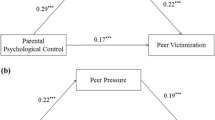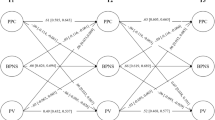Abstract
Previous research suggested that parental behavioral control and psychological control have differential associations with adolescents’ peer victimization. However, given that these two types of parental control are somewhat related but distinct from each other, it is critical to distinguish the unique relationship between each form of parental control and peer victimization. Furthermore, the mediating mechanism between parental control and peer victimization has not been thoroughly examined. The present study was designed to examine the unique associations of parental behavioral control and psychological control with Chinese adolescents’ peer victimization, as well as the mediating role of self-control. A total of 694 7th–9th grade middle school students in China (M age = 13.67, SD = 1.20) participated the survey by completing questionnaires about demographics, parental control, self-control, and peer victimization. Results indicated that: psychological control had positive associations with both overt and relational victimization, and these associations were partially mediated by adolescents’ self control. In contrast, behavioral control was positively associated with self-control, which in turn negatively associated with peer victimization. On the other hand, behavioral control was positively associated with peer victimization. Hence, an inconsistent mediation was found due to the opposite signs and the same magnitudes of the direct and indirect relationships between behavioral control and peer victimization. These findings suggest that parental behavioral control and psychological control contribute to adolescents’ peer victimization through different mediating mechanisms.


Similar content being viewed by others
References
Ahmad, I. (2009). Mothers’ parenting styles as predictors of Palestinian children’s peer victimization and aggression (Unpublished doctorial dissertation). Bloomington: Indiana University.
Barber, B. K. (1996). Parental psychological control: Revisiting a neglected construct. Child Development, 67, 3296–3319.
Barber, B. K. (2002). Intrusive parenting: How psychological control affects children and adolescents. Washington, DC: American Psychological Association.
Barber, B. K., Stolz, H. E., & Olsen, J. A. (2005). Parental support, psychological control, and behavioral control: Assessing relevance across time, culture, and method. Monographs of the Society for Research in Child Development, 70, 1–137.
Baumrind, D. (1971). Current patterns of parental authority. Developmental Psychology, 4, 27–51.
Boutwell, B. B., Franklin, C. A., Barnes, J. C., Tamplin, A. K., Beaver, K. M., & Petkovsek, M. (2013). Unraveling the covariation of low self-control and victimization: A behavior genetic approach. Journal of Adolescence, 36, 657–666.
Broudy, M. S. (2004). Parental monitoring and the development of peer victimization and adjustment in boys (Unpublished doctoral dissertation). New York: St. John’s University.
Chao, R. K. (1994). Beyond parental control and authoritarian parenting style: Understanding Chinese parenting through the cultural notion of training. Child Development, 65, 1111–1119.
Crick, N. R., & Grotpeter, J. K. (1996). Children’s treatment by peers: Victims of relational and overt aggression. Development and Psychopathology, 8, 367–380.
Duckworth, A. L. (2011). The significance of self-control. Proceedings of the National Academy of Sciences, 108, 2639–2640.
Duckworth, A. L., & Seligman, M. E. P. (2005). Self-discipline outdoes IQ in predicting academic performance of adolescents. Psychological Science, 16, 939–944.
Ellis, L. K., & Rothbart, M. K. (2001). Revision of the Early Adolescent Temperament.
Erceg-Hurn, D. M., & Mirosebich, V. M. (2008). Modern robust statistical methods: An easy way to maximize the accuracy and power of your research. American Psychologist, 63, 591–601.
Esbensen, F., Huizinga, D., & Menard, S. (1999). Family context and criminal victimization in adolescence. Youth and Society, 31, 168–198.
Fanti, K. A., & Kimonis, E. R. (2012). Bullying and victimization: The role of conduct problems and psychopathic traits. Journal of Research on Adolescence, 22, 617–631.
Finkenauer, C., Engels, R. C. M. E., & Baumeister, R. F. (2005). Parenting behavior and adolescent behavioral and emotional problems: The role of self-control. International Journal of Behavioral Development, 29, 58–69.
Finnegan, R. A., Hodges, E. V. E., & Perry, D. G. (1998). Victimization by peers: Associations with children’s reports of mother-child interaction. Journal of Personality and Social Psychology, 75, 1076–1086.
Fung, H. (1999). Becoming a moral child: The socialization of shame among young Chinese children. Ethos, 27, 180–209.
Galambos, N. L., Barker, E. T., & Almeida, D. M. (2003). Parents do matter: Trajectories of change in externalizing and internalizing problems in early adolescence. Child Development, 74, 578–594.
Giesbrecht, G. F., Leadbeater, B. J., & MacDonald, S. S. (2011). Child and context characteristics in trajectories of physical and relational victimization among early elementary school children. Development and Psychopathology, 23, 239–252.
Gottfredson, M. R., & Hirschi, T. (1990). A general theory of crime. Stanford, CA: Stanford University Press.
Hawk, S. T., Hale, W. W., Raaijmakers, Q. A. W., & Meeus, W. (2008). Adolescents’ perceptions of privacy invasion in reaction to parental solicitation and control. Journal of Early Adolescence, 28, 583–608.
Hawker, D. S. J., & Boulton, M. J. (2000). Twenty years’ research on peer victimization and psychosocial maladjustment: A meta-analytic review of cross-sectional studies. Journal of Child Psychology and Psychiatry, 41, 441–455.
Hay, C. (2001). Parenting, self-control, and delinquency: A test of self-control theory. Criminology, 39, 707–736.
Higgins, G. E., Jennings, W. G., Tewksbury, R., & Gibson, C. L. (2009). Exploring the link between low self-control and violent victimization trajectories in adolescents. Criminal Justice and Behavior, 36, 1070–1084.
Holtfreter, K., Reisig, M. D., Piquero, N. L., & Piquero, A. R. (2010). Low self-control and fraud offending, victimization, and their overlap. Criminal Justice and Behavior, 37, 188–203.
Jensen-Campbell, L. A., Knack, J. M., Waldrip, A., & Ramirez, M. (2009). The importance of personality and effortful control processes in victimization. In M. J. Harris (Ed.), Bullying, rejection, & peer victimization: A social cognitive neuroscience perspective (pp. 103–123). New York: Springer.
Ji, L., Chen, L., Xu, F., Zhao, S., & Zhang, W. (2011). A longitudinal analysis of the association between peer victimization and patterns of psychosocial adjustment during middle and late childhood (in Chinese). Acta Psychologica Sinica, 43, 1151–1162.
Keijsers, L., Branje, S., Hawk, S. T., Schwartz, S. J., Frijins, T., Koot, H. M., et al. (2012). Forbidden friends as forbidden fruit: Parental supervision of friendships, contact with deviant peers, and adolescent delinquency. Child Development, 83, 651–666.
Kerr, M., & Stattin, H. (2000). What parents know, how they know it, and several forms of adolescent adjustment: Further support for a reinterpretation of monitoring. Developmental Psychology, 36, 366–380.
Ladd, G. W., & Ladd, B. K. (1998). Parenting behaviors and parent-child relationships: Correlates of peer victimization in kindergarten? Developmental Psychology, 34, 1450–1458.
Leadbeater, B. J., Banister, E. M., Ellis, W. E., & Yeung, R. (2008). Victimization and relational aggression in adolescent romantic relationships: The influence of parental and peer behaviors, and individual adjustment. Journal of Youth and Adolescence, 37, 272–359.
Li, D., Zhang, W., Li, D., & Wang, Y. (2012). Parental behavioral control, psychological control, and aggression and social withdrawal in early adolescents (in Chinese). Psychological Development and Education, 28, 201–209.
Maccoby, E. E. (1984). Middle childhood in the context of the family. In W. A. Collins (Ed.), Development during middle childhood: The year from six to twelve (pp. 184–239). Washington, DC: National Academy Press.
MacKinnon, D. P., Krull, J. L., & Lockwood, C. M. (2000). Equivalence of the mediation, confounding and suppression effect. Prevention Science, 1, 173–181.
Meldrum, R. C. (2008). Beyond parenting: An examination of the etiology of self-control. Journal of Criminal Justice, 36, 244–251.
Pellegrini, A. D. (2001). Sampling instances of victimization by peer harassment in middle school: A methodological comparison. In J. Juvonen & S. Graham (Eds.), Peer harassment in school: The plight of the vulnerable and victimized (pp. 125–144). New York: Guilford.
Perry, D. G., Hodges, E. V. E., & Egan, S. K. (2001). Determinants of chronic victimization by peers: A review and a new model of family influence. In J. Juvonen & S. Graham (Eds.), Peer harassment in school: The plight of the vulnerable and victimized (pp. 73–104). New York: Guilford.
Pettit, G. S., Laird, R. D., Dodge, K. A., Bates, J. E., & Criss, M. M. (2001). Antecedents and behavior-problem outcomes of parental monitoring and psychological control in early adolescence. Child Development, 72, 583–598.
Preacher, K. J., & Hayes, A. F. (2004). SPSS and SAS procedures for estimating indirect effects in simple mediation models. Behavior Research Method, Instruments, and Computers, 36, 717–731.
Schreck, C. J. (1999). Criminal victimization and low self-control: An extension and test of a general theory of crime. Justice Quarterly, 16, 633–654.
Schreck, C. J., Stewart, E. A., & Fisher, B. S. (2006). Self-control, victimization, and their influence on risky lifestyles: A longitudinal analysis using panel data. Journal of Quantitative Criminology, 22, 319–340.
Schwartz, D., Chang, L., & Farver, J. M. (2001). Correlates of victimization in Chinese children’s peer groups. Developmental Psychology, 37, 520–532.
Schwartz, D., Dodge, K. A., Pettit, G. S., & Bates, J. E. (1997). The early socialization of aggressive victims of bullying. Child Development, 68, 665–675.
Shek, D. T. L. (2005). Perceived parental control and parent-child relational qualities in Chinese adolescents in Hong Kong. Sex Roles, 53, 635–646.
Shek, D. T. L. (2006). Perceived parental behavioral control and psychological control in Chinese adolescents in Hong Kong. The American Journal of Family Therapy, 34, 163–176.
Shek, D. T. L. (2007a). Perceived parental control based on indigenous Chinese parental control concepts in adolescents in Hong Kong. American Journal of Family Therapy, 3, 123–137.
Shek, D. T. L. (2007b). A longitudinal study of perceived parental psychological control and psychological well-being in Chinese adolescents in Hong Kong. Journal of Clinical Psychology, 63, 1–22.
Shrout, P. E., & Bolger, N. (2002). Mediation in experimental and non-experimental studies: New procedures and recommendations. Psychological Methods, 7, 422–445.
Smetana, J. G., & Daddis, C. (2002). Domain-specific antecedents of parental psychological control and monitoring: The role of parenting beliefs and practices. Child Development, 73, 563–580.
Soenens, B., & Vansteenkiste, M. (2010). A theoretical upgrade of the concept of parental psychological control: Proposing new insights on the basis of self-determination theory. Developmental Review, 30, 74–99.
Soenens, B., Vansteenkiste, M., Luyckx, K., & Goossens, L. (2006). Parenting and adolescent problem behavior: An integrated model with adolescent self-disclosure and perceived parental knowledge as intervening variables. Developmental Psychology, 42, 305–318.
Soenens, B., Vansteenkiste, M., Smits, I., Lowet, K., & Goossens, L. (2007). The role of intrusive parenting in the relationship between peer management strategies and peer affiliation. Journal of Applied Developmental Psychology, 28, 239–249.
Stattin, H., & Kerr, M. (2000). Parental monitoring: A reinterpretation. Child Development, 71, 1072–1085.
Testa, M., Hoffman, J. H., & Livingston, J. A. (2010). Intergenerational transmission of sexual victimization vulnerability as mediated via parenting. Child Abuse and Neglect, 35, 363–371.
Tourangeau, R., & Yan, T. (2007). Sensitive questions in surveys. Psychological Bulletin, 133, 859–883.
Tyler, K. A., & Johnson, K. A. (2006). A longitudinal study of the effects of early abuse on later victimization among high-risk adolescents. Violence and Victims, 21, 287–306.
Wang, Q., Pomerantz, E. M., & Chen, H. (2007). The role of parents’ control in early adolescents’ psychological functioning: A longitudinal investigation in the United States and China. Child Development, 78, 1592–1610.
Zhang, W., Chen, L., Ji, L., Zhang, L., Chen, G., & Wang, S. (2009). Physical and relational victimization, and children’s emotional adjustment in middle childhood (in Chinese). Acta Psychologica Sinica, 41, 433–443.
Author information
Authors and Affiliations
Corresponding author
Rights and permissions
About this article
Cite this article
Li, D., Zhang, W. & Wang, Y. Parental Behavioral Control, Psychological Control and Chinese Adolescents’ Peer Victimization: The Mediating Role of Self-Control. J Child Fam Stud 24, 628–637 (2015). https://doi.org/10.1007/s10826-013-9873-4
Published:
Issue Date:
DOI: https://doi.org/10.1007/s10826-013-9873-4




